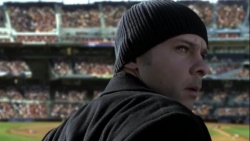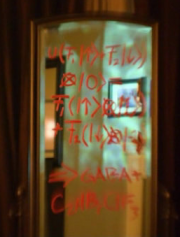m (→Flashforward) |
m |
||
| Line 36: | Line 36: | ||
* In the novel, the second flashforward goes very much ahead of time and only Lloyd Simcoe and a few others experience it, as they became immortal, sort of ''starchildren'' [http://en.wikipedia.org/wiki/2001:_A_Space_Odyssey_(novel)]; in the TV series, there is a sequence of other visions that terminate a poorly stockpiling of disappointing, last minute made-up explanations to a minute fraction of the various subplots that accumulated as the story developed. Even the original novel ending would have seemed less far-fetched. | * In the novel, the second flashforward goes very much ahead of time and only Lloyd Simcoe and a few others experience it, as they became immortal, sort of ''starchildren'' [http://en.wikipedia.org/wiki/2001:_A_Space_Odyssey_(novel)]; in the TV series, there is a sequence of other visions that terminate a poorly stockpiling of disappointing, last minute made-up explanations to a minute fraction of the various subplots that accumulated as the story developed. Even the original novel ending would have seemed less far-fetched. | ||
| − | In conclusion, the TV series has a splendid development but it is unfinished and hurriedly sabotaged. The novel is complete in this sense, but its overall implementation is not as good. They otherwise differ in quite equally interesting lines, which have little in common. Both suffer from flaws serious enough to allow ignoring them. | + | In conclusion, the TV series has a splendid development but it is unfinished and hurriedly sabotaged. The novel is complete in this sense, but its overall implementation is not as good. They otherwise differ in quite equally interesting lines, which have little in common. Both suffer from flaws serious enough to allow ignoring them. Besides, they do not even complement each other. |
Latest revision as of 09:18, 1 April 2019
Flashforward
Flashforward might be most famous for its 2009-2010 TV-series. It was a good one, based on an original plot: everybody is suddenly and mysteriously plunged into a blackout for 137 seconds, during which time—this is the genious part—everybody witnesses what would/will happen six months from then. When everybody awakes amidst chaos caused by over two minutes of collective loss of consciousness, we follow how the world handles this mind-blowing and mysterious situation.
It brings to popular culture themes from Deutsch's "Fabric of Reality", a delightful fictionalization of deep modern questions.
Sadly, the series was discontinued due to modest (but not bad) followup from the public of the ABC network which hosted it. This is one of the example where creation motivated by money leads to complete rubbish, as the whole thing has been completely spoiled by the hurried and random conclusion to bring an end to something which didn't satisfy its investors. Another example is Lost which is complete rubbish from the start, but as it enjoyed on the opposite a voluminous audience, it was prolonged ad nauseam.
TV series are one of the possible channels of artistic creation, even for something which qualifies as a monolithic Œuvre, a consistent piece as a whole rather than a series of essentially independent episodes. In the hands of Luigi Comencini, for instance, TV series gave us masterpieces like Le avventure di Pinocchio. As they are, however, more closely and directly related to their funding, they suffer in real time from such distortions brought by the requirement of juicy, immediate benefits. The ABC network obviously does not care about the artistic value of what they set in motion, they just want to see dollars flowing out of it. Thankfully, a novel or a movie for the cinema will go mainly through the artistic process first, and money will speak later. If it's a disaster for the box office, it might still grace the catalog of cult movies or constitute a lasting chef d'oeuvre, for those who care. (Brazil is but one example).
So much against the usual discourse that capitalism is a motor and a necessity for artists to express themselves. It is, in facts, an insult to authors and to their audience.
Flashforward is initially a Sci-Fi novel, from Robert J. Sawyer. You might think it's where to fall back if you enjoyed the series and got obviously disappointed by the despicable waste the ABC network made of it. Well, no. There is virtually nothing in common between the two, beyond the central idea of a collective blackout that yields a glimpse of the future.
(spoilers follow)
The formula seems to read $U(F_1|\uparrow\rangle+F_2|\downarrow\rangle)\otimes|0\rangle=F_1(|\uparrow\rangle\otimes|\downarrow\rangle)+F_2(|\downarrow\rangle\otimes|\uparrow\rangle$
(sic), with some implication to what seems like a chemical reaction.
Here we have some entanglement and possibly some cloning of quantum states which don't make sense for these tensor products, but that's acceptable when written in lipsticks on a mirror for a blurry 2s impression.
The only character in common is Lloyd Simcoe. Everything else takes so different routes, it is hard to say which of the original novel or its TV inspiration is better. I said the TV series was wasted by its mid-flight abortion, but the novel isn't great either, although the main idea and its particular implementation are original and interesting. They are however not well put in perspective. The apocalypse that follows the blackout is nowhere convincing like in the TV series. For instance, the news digests that should give a taste of the state of shock the world is in, are a collection of futile oddities. The reaction of people are blunt, their understanding precipitated (the realization that death is the logical implication of not having a vision during the blackout is immediate and natural while the deduction that the flashforward is a "mosaic" of the future is awkward and silly). Feelings are artificial or out-of-proportion, both ways (a disconsolate mother letting her child's corpse in the street, a prospective victim randomly suspecting close acquaintances for absurd motives, a couple of scientists realizing they'll have sex together...) Even the details ring false, such as the commercial deals from the airline companies, with business class upgrades for those willing to fly in this time of chaos... as if after the Fukushima catastrophe, Tepco would be concerned in offering special discount packages to daring customers. Somehow, the whole depiction of the situation is far from realistic, always stumbling over some uninteresting details. The TV series, on the other hand, made everything sound just right.
Other differences are otherwise only a matter of taste from the authors/adaptators. These are the main ones:
- In the novel, the jump is over 20 years ahead; in the TV series, it's only six months.
- In the novel, the LHC running at full power (in conjunction with a flux of neutrino which makes the phenomenon not predictable or reproducible at will) triggers the time-displacement; in the TV series, it's part of a big conspiracy involving quantum entanglement devices and a mysterious technology [1].
- In the novel, consequences of the flashforward are mainly pursued on the psychological, social and scientific levels, with only a few passages of suspense and intrigue (related to whom murdered the assistant of Lloyd Simcoe); in the TV series, this is the other way around, with the cause and the nature of the flashforward as the central question (and it's now the assistant of Benford, the main criminal investigator, whose death is at the center of one of the intrigues. There are also many more characters and plots).
- During the flashforward, in the novel, nothing is registered by measuring apparatus, such as cameras (maybe because of the antrophic principle, which is a nice catch); in the TV series, cameras and other devices kept recording everything. This offered one of the best piece of the show [2].
- In the novel, the flashforward is willingly reproduced; in the TV series, authorities try to prevent it.
- In the novel, the second flashforward goes very much ahead of time and only Lloyd Simcoe and a few others experience it, as they became immortal, sort of starchildren [3]; in the TV series, there is a sequence of other visions that terminate a poorly stockpiling of disappointing, last minute made-up explanations to a minute fraction of the various subplots that accumulated as the story developed. Even the original novel ending would have seemed less far-fetched.
In conclusion, the TV series has a splendid development but it is unfinished and hurriedly sabotaged. The novel is complete in this sense, but its overall implementation is not as good. They otherwise differ in quite equally interesting lines, which have little in common. Both suffer from flaws serious enough to allow ignoring them. Besides, they do not even complement each other.

